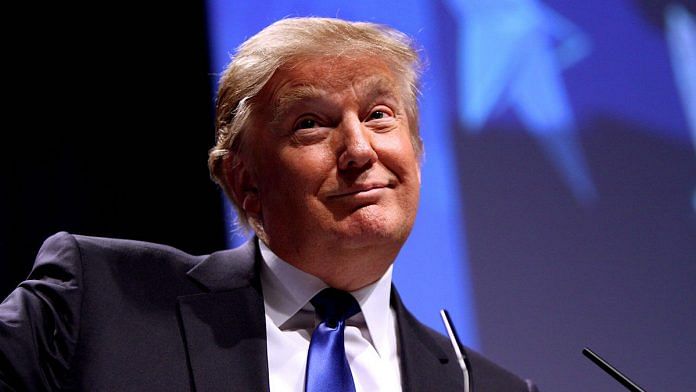Diplomatic Trump strikes deal to save ‘Dreamers’
In a surprising display of bipartisanship, U.S. President Donald Trump met with Democrat leaders to pass legislation in order to protect 700,000 ‘Dreamers’, the children of illegal immigrants. The Democrats in return have agreed to a border security proposal by Trump that excludes his campaign promise of a wall along the Mexico border.
In an uncharacteristic move, Trump hosted Democrat leaders Chuck Schumer and Nancy Pelosi for dinner, after which the deal was announced.
“We agreed to enshrine the protections of DACA into law quickly, and to work out a package of border security, excluding the wall, that’s acceptable to both sides,” the Democrat leaders said in a statement.
The White House statement did not specify what had been agreed to.A spokesperson said that there was no question of Trump backing down on his campaign promise for the Mexico wall.
However, the unexpected diplomatic move by Trump has reportedly left Democrats cautiously optimistic while the Republicans wondering what’s happening.
Pakistan doesn’t have to satisfy US, says its defence minister
If Donald Trump’s speech was anything to go by, the US was reassessing its ties with Pakistan. But Pakistan’s defence minister said that they are also reassessing their ties with the US.
Khurram Dastgir Khan told reporters Wednesday that they would give their point of view “logically and with evidence to the US” but it wasn’t for them “to satisfy” the Trump administration. He also bemoaned the fact that the U.S. did not share its threat perception about India which was indulging in warmongering.
Khan said that a nexus between India, the U.S. and Afghanistan threatened Pakistan and that the U.S. was ignoring it because of its strategic interests. The Defence Minister’s statements come just ahead of a meeting with US Secretary of State Rex Tillerson and the Pakistan PM.
Myanmar says 40 percent Rohingya villages now lie empty
With an estimated 300,000 having fled their homes to escape the military’s crackdown, at least 40 percent of the Rohingya villages in Myanmar were either completely deserted or partially deserted, a government spokesperson said.
The spokesperson said that of the 471 villages targeted in “clearance operations” by the army since August, 176 were empty and at least 34 others had been partially abandoned, The Guardian reported.
UN Secretary-General Antonio Guterres and the UN Security Council Wednesday called on the Myanmar government to end its military campaign against the Rohingya Muslims. However, the only effect the appeals seem to have had is that Aung San Suu Kyi has cancelled her speech at the UN General Assembly.
China’s plan to get farmers to stop burning agricultural waste
China, which is also battling to clean up its air, has a problem with farmers who burn agricultural waste. While India struggles to get its farmers to dispose their agricultural waste through means other than burning, China has an alternative solution for farmers, reports the South China Morning Post.
The country has announced that it will use leftovers like stalks to generate biofuel which in turn can power its vehicles. China says it will blend more ethanol in petrol, more specifically 10 percent by 2020, in order to get agricultural waste disposed in more efficient ways than burning.
While this could reduce oil imports as well, not everyone is convinced it’s a great idea. Critics have pointed out that the generation of biofuel is not very environmentally friendly. Also it’s not certain farmers will cooperate with such a policy, much like their Indian counterparts, where the cost of transporting the agricultural waste could be more than the price they receive for it.
Your chocolate comes at the cost of forests
A Guardian report says that a lot of the cococa that is consumed globally is coming at the cost of forests. The report says that cocoa traders in Ivory Coast, which accounts for 40 percent of the world’s cocoa supply have been cutting forests to plant cocoa trees.
These beans are then blended with other ‘clean’ beans, grown in agricultural areas, to be sold to some of the biggest chocolate manufacturers. Among those who buy the ‘dirty’ cocoa beans include Mars, Nestlé, Mondelez and other big brands.
The companies say they know about the presence of ‘dirty’ beans and are working to reduce the amount that goes into their chocolates. But if they don’t move fast, the entire forest cover in the nation could be gone by 2030 at this rate, says environmental group Mighty Earth which is publishing an investigation into how cocoa plantations are destroying forests.



